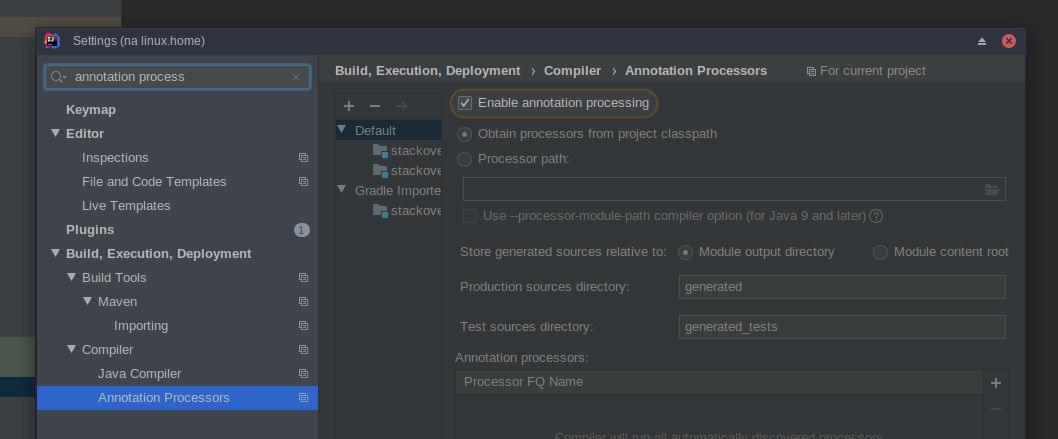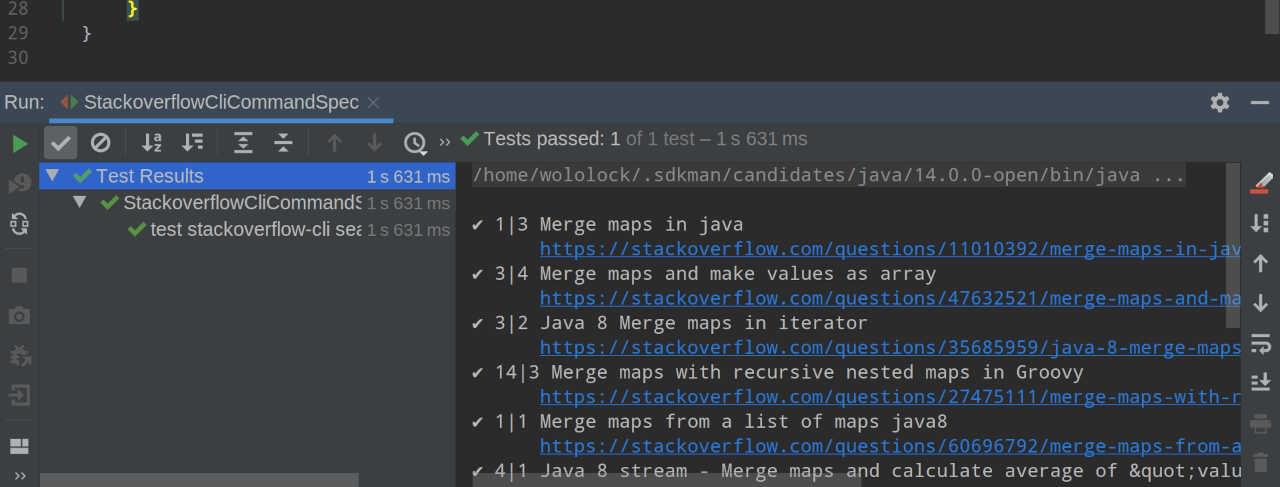Building stackoverflow-cli with Java 11, Micronaut, Picocli, and GraalVM
In this blog post, I show you how to build stackoverflow-cli - a command-line application that allows you to search Stack Overflow questions directly from the terminal window. I use Java 11+, Micronaut, Picocli, and GraalVM’s native-image.
Introduction
Let’s start with explaining what the stackoverflow-cli application may look like. Below you can find what the final application’s help page may look like, as well as a help page for the search command, and an exemplary search result.
$ stackoverflow-cli -h
Usage: stackoverflow-cli [-hvV] [COMMAND]
...
-h, --help Show this help message and exit.
-v, --verbose ...
-V, --version Print version information and exit.
Commands:
search
$ stackoverflow-cli search -h
Usage: stackoverflow-cli search [-hV] [-n=] [-q=] [-s=]
[-t=]
-h, --help Show this help message and exit.
-n, --limit=<limit> Limit the number of results to specific number.
Default: 10
-q, --query=<query> Search phrase
-s, --sort-by=<sort> Available options: relevance (default), activity,
votes, creation
-t, --tags=<tag> Limit search to the specific tag
-V, --version Print version information and exit.
$ stackoverflow-cli search -q "java stream api" -t java -n 4
✔ 5|3 Java Stream API filter
https://stackoverflow.com/questions/56691000/java-stream-api-filter
✔ 4|5 Java Stream API collect method
https://stackoverflow.com/questions/56748468/java-stream-api-collect-method
✔ 0|2 Java Stream API
https://stackoverflow.com/questions/51712988/java-stream-api
✔ 4|2 Java Stream API map argument
https://stackoverflow.com/questions/49936865/java-stream-api-map-argument Installing Micronaut CLI tool
Creating a new project
| Source code and resources links available in the wololock/stackoverflow-cli repository. |
Once SDKMAN! is installed, we can create a new project. We use create-cli-app to generate a CLI-based project with the Picocli support added. We can define the minimum JDK version with --jdk option. In this example I also set the testing framework to Spock, and I add two features: graalvm and http-client.
$ mn create-cli-app --jdk=11 -t spock -f graalvm,http-client com.github.wololock.stackoverflow-cliInstead of using the mn command-line tool, you can use Micronaut Launch web starter to bootstrap new project. |
Enable annotation processing
Preparing the unit test
The application created with create-cli-app comes with a single unit test we can extend to test our final expectation.
package com.github.wololock
import io.micronaut.configuration.picocli.PicocliRunner
import io.micronaut.context.ApplicationContext
import io.micronaut.context.env.Environment
import spock.lang.AutoCleanup
import spock.lang.Shared
import spock.lang.Specification
class StackoverflowCliCommandSpec extends Specification {
@Shared @AutoCleanup ApplicationContext ctx = ApplicationContext.run(Environment.CLI, Environment.TEST)
void "test stackoverflow-cli search command"() {
given:
ByteArrayOutputStream baos = new ByteArrayOutputStream()
PrintStream out = System.out
System.setOut(new PrintStream(baos))
String[] args = ["search", "-q", "merge maps", "-t", "java", "--verbose"] as String[]
PicocliRunner.run(StackoverflowCliCommand, ctx, args)
out.println baos.toString() (1)
// ✔ 9|3 Merge maps in Groovy
// https://stackoverflow.com/questions/213123/merge-maps-groovy
expect: (2)
baos.toString() =~ $/✔? \d+\|\d+ [^\n]+\n {6}https://stackoverflow.com/questions/\d+/[a-z0-9\-]+/$
}
}We use this test to achieve two things. Firstly, we want to print the output of the command to the standard output. And secondly, we want to test if the output matches given regular expression.
Implementing the declarative HTTP client
In the next step, we can implement HTTP client that communicates with the Stack Exchange REST API. We are going to use Micronaut’s declarative HTTP client to do so. We create an interface called StackOverflowHttpClient and we annotate it with the @Client(url) annotation . The client’s URL is taken from the configuration property defined in the application.yml file. Next, we create the search method annotated with @Get(path) annotation . This annotation defines HTTP method (GET in this case) and the request’s path. We also use @QueryValue annotations to map querystring parameters with the method arguments.
package com.github.wololock.api;
import io.micronaut.http.annotation.Get;
import io.micronaut.http.annotation.QueryValue;
import io.micronaut.http.client.annotation.Client;
@Client("${stackoverflow.api.url}") (1)
public interface StackOverflowHttpClient {
@Get("/search?site=stackoverflow") (2)
ApiResponse<Question> search(
@QueryValue("intitle") String query, (3)
@QueryValue("tagged") String tag,
@QueryValue("pagesize") int limit,
@QueryValue("sort") String sort
);
}And here is the application.yml file that defines stackoverflow.api.url configuration property.
micronaut:
application:
name: stackoverflowCli
stackoverflow:
api:
url: https://api.stackexchange.com/2.2Next, we need to implement ApiResponse<T> and Question classes. We use them to deserialize a raw JSON response into an instance of ApiResponse<Question>. We can implement both classes as a regular Java POJO’s with getters and setters, or we can use public fields keep as simple as possible. In both cases, however, we want to add @Introspected annotation to instruct Micronaut to use a reflection-free Jackson module to handle serialization and deserialization. It’s a nice boost, but it is also a mandatory step if we want to use those classes in the final native executable file.
Here’s an implementation of the ApiResponse<T> class.
package com.github.wololock.api;
import com.fasterxml.jackson.annotation.JsonProperty;
import io.micronaut.core.annotation.Introspected;
import java.util.Collections;
import java.util.List;
@Introspected (1)
final public class ApiResponse<T> {
public List<T> items = Collections.emptyList();
@JsonProperty("has_more")
public boolean hasMore;
@JsonProperty("quota_max")
public int quotaMax;
@JsonProperty("quota_remaining")
public int quotaRemaining;
}And here’s an implementation of the Question class.
package com.github.wololock.api;
import com.fasterxml.jackson.annotation.JsonProperty;
import io.micronaut.core.annotation.Introspected;
@Introspected
final public class Question {
public String title;
public String link;
public int score;
@JsonProperty("answer_count")
public int answers;
@JsonProperty("is_answered")
public boolean accepted;
}Keep in mind we used @JsonProperty over the fields that didn’t match the same naming convention between POJO class (camelCase) and the JSON body (snake_case). Alternatively, we could use @JsonNaming(PropertyNamingStrategy.SnakeCaseStrategy.class) over the class to get the same result.
Implementing the search command
Once we implemented the HTTP client, it’s time to implement the search command of the stackoverflow-cli app. We start with creating a new class - SearchCommand. Picocli requires, that the command class implements either Runnable or Callable<T> interface. The main difference is that the first one does not return any value, so if you want to return an exit code, you may want to use Callable<Integer> instead of a Runnable interface.
Next, the newly created class has to be annotated with the @Command annotation . We use it to define the command name search, its description, and we also use the standard help mixin to instruct Picocli to generate a default help page based on the command’s options.
Speaking of options, we define them as class fields and we add @Option annotation that specifies each option name (or names if you want to use short and long option name formats).
We also inject previously created StackOverflowHttpClient .
The desired business logic of the search command happens in the run method . We call client.search(query, tag, limit, sort) with the parameters retrieved from the command line. Once the data is fetched from the REST API, we display format each question the helper formatQuestion method, and then we print it. One thing worth mentioning is the usage of Ansi.AUTO.string() method with the ANSI colors and styles applied .
package com.github.wololock.search;
import com.github.wololock.api.Question;
import com.github.wololock.api.SearchHttpRequest;
import com.github.wololock.api.StackOverflowHttpClient;
import picocli.CommandLine.Command;
import picocli.CommandLine.Help.Ansi;
import picocli.CommandLine.Option;
import javax.inject.Inject;
@Command(name = "search", description = "Search questions matching criteria.",
mixinStandardHelpOptions = true) (1)
final public class SearchCommand implements Runnable {
@Option(names = {"-q", "--query"}, description = "Search phrase.") (2)
String query = "";
@Option(names = {"-t", "--tag"}, description = "Search inside specific tag.")
String tag = "";
@Option(names = {"-n", "--limit"}, description = "Limit results. Default: 10")
int limit = 10;
@Option(names = {"-s", "--sort-by"}, description = "Available values: relevance, votes, creation, activity. Default: relevance.")
String sort = "relevance";
@Option(names = {"--verbose"}, description = "Print verbose output.")
boolean verbose;
@Inject
StackOverflowHttpClient client; (3)
@Override
public void run() { (4)
var response = client.search(query, tag, limit, sort);
response.items.stream()
.map(SearchCommand::formatQuestion)
.forEach(System.out::println);
if (verbose) {
System.out.printf(
"\nItems size: %d | Quota max: %d | Quota remaining: %d | Has more: %s\n",
response.items.size(),
response.quotaMax,
response.quotaRemaining,
response.hasMore
);
}
System.exit(0);
}
static private String formatQuestion(final Question question) {
return Ansi.AUTO.string(String.format(
"@|bold,fg(green) %s|@ %d|%d @|bold,fg(yellow) %s|@\n %s", (5)
question.accepted ? "✔" : "",
question.score,
question.answers,
question.title,
question.link
));
}
}When using Micronaut’s declarative HTTP client, it is worth adding System.exit(0) at the end of the command’s run() method. This way we force to shut down the application instantly, without waiting 2 seconds until Netty gracefully shuts down all event loop groups. |
After implementing the command class, we need to register it as a subcommand in the main application class. We do it by adding SearchCommand.class to the subcommands array of the @Command annotation in the main class .
package com.github.wololock;
import com.github.wololock.search.SearchCommand;
import io.micronaut.configuration.picocli.PicocliRunner;
import io.micronaut.context.ApplicationContext;
import picocli.CommandLine;
import picocli.CommandLine.Command;
import picocli.CommandLine.Option;
import picocli.CommandLine.Parameters;
@Command(name = "stackoverflow-cli", description = "...",
mixinStandardHelpOptions = true, subcommands = {SearchCommand.class}) (1)
public class StackoverflowCliCommand implements Runnable {
@Option(names = {"-v", "--verbose"}, description = "...")
boolean verbose;
public static void main(String[] args) throws Exception {
PicocliRunner.run(StackoverflowCliCommand.class, args);
}
public void run() {
// business logic here
if (verbose) {
System.out.println("Hi!");
}
}
}After that, we can run the unit test to see the results.
Installing GraalVM and native-image
The last step is to compile the application to the native executable file. Before we do so, we need to install GraalVM and the native-image tool. Below you can find step by step guide using SDKMAN!.
$ sdk install java 20.1.0.r11-grl
Downloading: java 20.1.0.r11-grl
In progress...
#################################################################################### 100,00%
Repackaging Java 20.1.0.r11-grl...
Done repackaging...
Installing: java 20.1.0.r11-grl
Done installing!
Do you want java 20.1.0.r11-grl to be set as default? (Y/n): n
$ sdk use java 20.1.0.r11-grl
Using java version 20.1.0.r11-grl in this shell.
$ java -version
openjdk version "11.0.7" 2020-04-14
OpenJDK Runtime Environment GraalVM CE 20.1.0 (build 11.0.7+10-jvmci-20.1-b02)
OpenJDK 64-Bit Server VM GraalVM CE 20.1.0 (build 11.0.7+10-jvmci-20.1-b02, mixed mode)
$ gu install native-image
Downloading: Component catalog from www.graalvm.org
Processing Component: Native Image
Downloading: Component native-image: Native Image from github.com
Installing new component: Native Image (org.graalvm.native-image, version 20.1.0)
$ native-image --version
GraalVM Version 20.1.0 (Java Version 11.0.7)Depending on when you read this blog post, version 20.1.0.r11-grl may not exist anymore in the SDKMAN. Run sdk list java to find the latest GraalVM version available. |
Compiling final native executable file
Once we installed GraalVM, native-image, and we switched the Java to the GraalVM’s one, we can firstly assemble our application to the JAR file.
$ ./gradlew --no-daemon assemble
To honour the JVM settings for this build a new JVM will be forked. Please consider using the daemon: https://docs.gradle.org/6.5/userguide/gradle_daemon.html.
Daemon will be stopped at the end of the build stopping after processing
> Task :compileJava
Note: Writing native-image.properties file to destination: META-INF/native-image/com.github.wololock/stackoverflow-cli/native-image.properties
Note: Writing reflection-config.json file to destination: META-INF/native-image/com.github.wololock/stackoverflow-cli/reflection-config.json
Note: Writing resource-config.json file to destination: META-INF/native-image/com.github.wololock/stackoverflow-cli/resource-config.json
Note: Creating bean classes for 3 type elements
Note: ReflectConfigGen writing to: CLASS_OUTPUT/META-INF/native-image/picocli-generated/reflect-config.json
Note: ResourceConfigGen writing to: CLASS_OUTPUT/META-INF/native-image/picocli-generated/resource-config.json
Note: ProxyConfigGen writing to: CLASS_OUTPUT/META-INF/native-image/picocli-generated/proxy-config.json
BUILD SUCCESSFUL in 10s
10 actionable tasks: 10 executedNext, we can run native-image compilation. It takes some time, and may utilize all available cores on your laptop, so be aware of it.
$ native-image --no-server -cp build/libs/stackoverflow-cli-*-all.jar
[stackoverflow-cli:614922] classlist: 4,204.35 ms, 1.18 GB
[stackoverflow-cli:614922] (cap): 1,080.85 ms, 1.18 GB
[stackoverflow-cli:614922] setup: 3,027.05 ms, 1.18 GB
WARNING GR-10238: VarHandle for static field is currently not fully supported. Static field private static volatile java.lang.System$Logger jdk.internal.event.EventHelper.securityLogger is not properly marked for Unsafe access!
[stackoverflow-cli:614922] (clinit): 1,542.14 ms, 4.85 GB
[stackoverflow-cli:614922] (typeflow): 31,615.83 ms, 4.85 GB
[stackoverflow-cli:614922] (objects): 33,949.48 ms, 4.85 GB
[stackoverflow-cli:614922] (features): 3,764.04 ms, 4.85 GB
[stackoverflow-cli:614922] analysis: 74,941.32 ms, 4.85 GB
[stackoverflow-cli:614922] universe: 2,433.46 ms, 4.85 GB
[stackoverflow-cli:614922] (parse): 6,762.73 ms, 4.85 GB
[stackoverflow-cli:614922] (inline): 9,066.65 ms, 5.18 GB
[stackoverflow-cli:614922] (compile): 54,236.90 ms, 4.74 GB
[stackoverflow-cli:614922] compile: 73,993.64 ms, 4.74 GB
[stackoverflow-cli:614922] image: 7,939.30 ms, 4.82 GB
[stackoverflow-cli:614922] write: 1,066.98 ms, 4.82 GB
[stackoverflow-cli:614922] [total]: 167,963.48 ms, 4.82 GB
$ ls -lah stackoverflow-cli
-rwxrwxr-x 1 wololock wololock 54M 07-08 11:26 stackoverflow-cliOnce the native binary file is created (54 megabytes, it’s not mistaken), we can run a final test to search questions matching stream foreach phrase inside the java tag, and we can limit the output to 4 most relevant questions.
$ ./stackoverflow-cli search --verbose -n 4 -t java -q "stream foreach"
✔ 313|13 Break or return from Java 8 stream forEach?
https://stackoverflow.com/questions/23308193/break-or-return-from-java-8-stream-foreach
✔ 26|4 Incrementing counter in Stream foreach Java 8
https://stackoverflow.com/questions/38568129/incrementing-counter-in-stream-foreach-java-8
✔ 46|4 Java 8 Lambda Stream forEach with multiple statements
https://stackoverflow.com/questions/31130457/java-8-lambda-stream-foreach-with-multiple-statements
0|0 Java stream forEach
https://stackoverflow.com/questions/44951862/java-stream-foreach
Items size: 4 | Quota max: 300 | Quota remaining: 292 | Has more: true






0 Comments